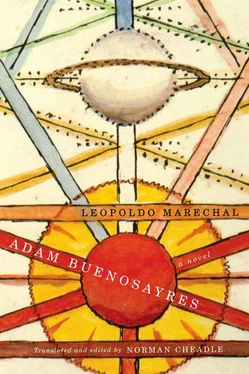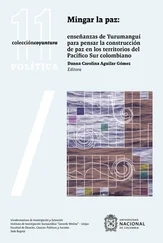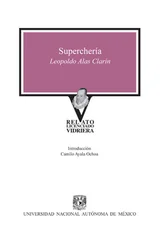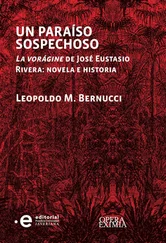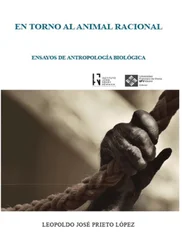— And you? the false Muse asked him, studying him carefully.
— I put my art at the service of social justice, answered Red Tunic.
— That’s turning the hierarchy upside down! scolded the angelic pipsqueak. There is a hierarchical order of values obtaining among human activities, and it would be dangerous to destroy it. By virtue of its transcendence and universality, the metaphysical plane is superior to the artistic, and the artistic is superior to the political. Art can serve metaphysics without lowering itself, since by doing so it rises to a higher sphere. On the other hand, by serving any activity of lower rank in the hierarchy, art loses its freedom and falls into the servitude of the inferior.
— Rubbish! exclaimed Red Tunic. Like I just said, he’s a well-known Holy Joe.
At this point, forgetting the norms of caution I’d imposed upon myself, I again intervened in the debate.
— If I’m not mistaken, I said turning to the astrologer, the tunicked pipsqueak has hit the nail right on the head. And I’ll go further: if he gave his thickets of angels a good pruning and lopped off a few number sevens, I do believe the tunicked pipsqueak would deserve a promotion in this Helicoid.
My words produced a disastrous effect:
— Who are you to play the redeemer? the false Muse practically spat at me.
— And who gave this tourist the right to prune my angels? whined the tunicked pipsqueak.
— I know him! said the red tunic. He’s a fifi from the new generation who used to come over to Boedo Street every night and mock the libertarian muse.
With the tumult intensifying and the False Euterpe’s entourage threatening to attack, I beat a retreat that to this day I do not consider shameful. However, the astrologer Schultz, having caught up with me, stopped me at a gathering of ladies and gentlemen lying around on the fake grass.
It was immediately obvious that another hideous Antimuse was in charge of this group. The False Erato 142was distinguished by badly bleached hair, two pale eyes underlined by smoky black bags, a big, rouge-inflated mouth, and a crusted-over complexion flaking off layers of ancient, dried-out makeup. She sat on the ground, legs splayed out, a few wisps of tulle veiling the now withered charms of an old whore. Puffing on an outrageously long quellazaire ending in a Turkish cigarette, she exhibited hands with all five fingers a-glitter with cheap rings and fake jewels. To the left and right of her, clumps of poetesses were likewise lounging on the ground, along with a swarm of erotic poets who’d dreamed up false loves and lied about amorous adventures. The poetesses dilated their burning eyes, rolled around on the fake grass, or avidly sniffed at cloth roses. The poets, in a robotic frenzy, pretended to pull out the cardboard arrows apparently piercing their sides.
In silence, I let my gaze wander over the various groups, here pausing on a woman who, when she recognized me, put an imploring finger to her lips, or there diverting my glance from a man who turned away lest he be recognized. The discretion observed by the erotic poets seemed to bode well; and when Schultz, without a word, tapped me on the shoulder to signal it was time to leave, I realized he was generously sparing me a dialogue that might well have been more than disagreeable, and in mente I swore him eternal gratitude.
Encouraged by this turn of fortune, I decided then and there that Schultz wasn’t going to foist the complete series of his Antimuses upon me. I started walking faster, though not yet in flat-out flight, and I glanced left and right, ready to swerve and feint. Unfortunately, in attempting to avoid the groups surrounding the Antimuses, I bumped into a voluminous female crossing the meadow with no entourage at all; her wide black tunic imperfectly hid the enormous development of her buttocks, the adipose sphere of her belly, the torrential overflow of her udders, and her elephantine legs blue with varicose veins. After our collision, the False Melpomene (for that’s who she was) clapped porcine little eyes on me:
— Watch where you’re going! she shouted at me in a harsh voice. What’s the big idea, ploughing into people like that?
— Pardon me, I said. I never would have expected to find Madame walking so alone.
A grimace of hatred pursed her luxuriantly mustachioed lips:
— Those scatter-brained whoresons up above! she exclaimed. Buenos Aires has lost the notion of drama. What happened to all the porteños who used to burst with indignation at the circus when they beheld the heroic figure of Juan Moreira? 143And those whose eyes grew moist as they watched the final scene of Barranca abajo ? 144And what of the philodramatic hosts who would mount serious plays like Juan José 145or Cena de las burlas 146in their little neighbourhood theatres, before audiences of girls sobbing and old women sniffling and riled-up compadritos fit to bust a gut? Those bastards up there are now in full farcical mode. To hell with the sons of whores!
— Don’t send them quite so far, I implored her timidly. According to Aristotle, every tragic scene must elicit the spectators’ compassion. Now then, it isn’t easy to feel another’s pain if one’s own flesh has never suffered it. And it’s been a long time since our beloved city has suffered a tragedy.
— Degenerates! rebuked the False Melpomene. They stuff themselves in luxury restaurants, and then plop their fat butts into Pullman seats, where they guffaw, hoot, belch, and laboriously digest their meals. But you can sure, before they go to the show, they take a good look at the marquees: “A thousand laughs per hour at the Astral .” 147Fine! Laughter stimulates the peristaltic movement of the large intestine. And if by mistake they end up watching a drama, they laugh all the same. A mother weeps over her son’s grave? Muffled laughter in the orchestra seats. Two lovers discuss their unhappiness? Convulsive hilarity in the gallery.
The False Melpomene fell silent. Then, gloomy and alone, she walked away muttering a endless stream of profanities.
— If you think about it, I said to Schultz, the poor old roly-poly is quite right.
But at that moment, without giving us a chance to take defensive action, the retinue of the False Terpsichore 148descended upon us, imprisoned us within a hermetic circle, and began to execute dance steps: tango, foxtrot, walse, Charleston, and polka. They danced alone or in couples, spinning and twisting and throwing themselves out of joint like rag dolls. And the vertiginous circle was closing in tighter and tighter around us. Then, after exchanging a look with Schultz, I put my head down, closed my eyes, and charged violently against the dancers. The circle was broken, I fell down, got up again instantly, and took off running with the astrologer right behind me, for he had imitated my escape technique. Just when we thought we were out of harm’s way, the False Thalia 149attempted to detain us with her vaudeville troupe.
— Don’t take off, rubes! she shouted at us. The trick’s easy. Toss in a gallego , an Italian, a Turk, and a compadrito . Shake well. And out comes a sainete criollo , a home-grown comic farce. 150
Paying no attention, we lunged straight into thespian rabble already in combat formation. By dint of strenuous dekes and dodges learned on soccer fields, we managed to pick our way through the crowd.
The pseudo-Parnassus had been left behind. Now came the sector of the Despots and Traitors. The discretion I adopted at the beginning of this chronicle of my journey through Schultz’s Helicoid will serve to justify the merciful tact I’ll now use in describing this new sector. Fortunately, I caught only a panoramic view of it. As in the classics, Schultz had included traitors and tyrants in the Hell of Violence; due to his furious personality, however, he had lumped them together in a common environment, as though he meant to convey that despotism is a form of treachery, and treachery a figure of despotism. Moreover, and just as he had done with the other human passions, in this new sector the astrologer had refrained from displaying those historical personalities who could very well have served as paradigms. Instead, with a view to disinterested generalization, he had gathered a bunch of anonymous exemplars.
Читать дальше
